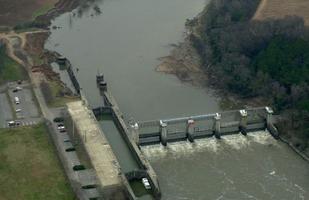Congressmen Rick Allen (R-Ga.) and Mike Collins (R-Ga.) have battled to save the historic New Savannah Bluff Lock and Dam for years, and it appears that a water resources bill with the two representatives’ additions may settle the matter for good.
H.R. 8812, the bipartisan Water Resources Development Act of 2024 (WRDA), sponsored by Representative Sam Graves (R-Mo.), includes language that specifies that the pool on the Savannah River in downtown be maintained at 114.5 feet.
The bill has made its way out of committee and should land on the floor of the House in a couple of weeks, according to press releases sent by both congressmen’s offices.
The language of the bill does not specifically force the U.S. Army Corps of Engineers to keep or maintain the current structure, which was built in 1937 when Augusta was an inland port.
The locks on the structure have not been fully operational in years, and the Corps of Engineers have long favored demolishing the dam and replacing it with a rock weir that would lower the pool by several feet. The weir, according to the Corps of Engineers, would also allow the threatened sturgeon to swim upstream to what was once the species spawning grounds.

However, the Corps of Engineers faced public outrage when they conducted two simulated drawdowns that damaged property, left docks high and dry and created a massive mudflat.
The matter has been tied up in the courts for years, with the latest ruling in April 2023 from the U.S. 4th Circuit Court of Appeals upheld a November 2020 decision that ordered the U.S. Army Corps of Engineers to maintain the structure.
Stipulations in the Water Infrastructure Improvements for the Nation (WIIN) Act of 2016 were meant to protect the historic structure; however, the Act did not provide funding for repairs, and the Corps of Engineers have used the vague language in the act to argue their position in court.
The WRDA also does not include any appropriations for repairing or maintaining the lock and dam, but if it passes the full Congress, the court cases may be rendered moot. To maintain the pool at 114.5 feet, the Corps of Engineers will be left with no choice but to repair the structure or replace it with a new dam, potentially one that includes “fish ladders” to allow the sturgeon to swim upstream.
Allen, who testified before the House Transportation and Infrastructure Committee in January, says it looks like the combined efforts of those who want to save the dam and maintain the pool are beginning to pay off.
“The committee’s passage of H.R. 8812 is a monumental first step toward a permanent solution that works for job creators, municipalities, and most importantly, residents of the CSRA. I look forward to seeing this legislation considered on the House floor in short order,” Allen said.
Scott Hudson is the Senior Investigative Reporter and Editorial Page Editor for The Augusta Press. Reach him at scott@theaugustapress.com









